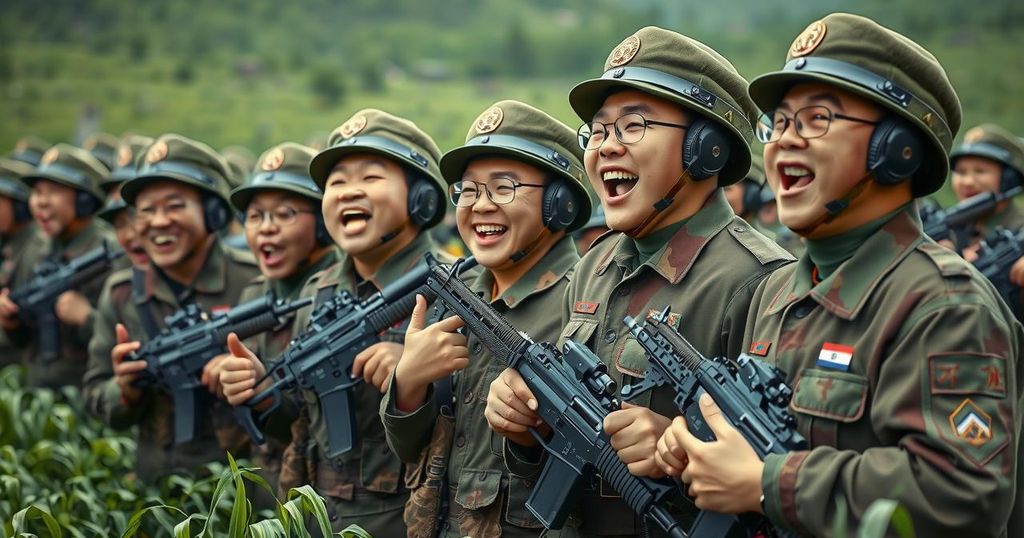North Korea and Russia Amplify Military Alliance Through Propaganda

North Korea and Russia are increasingly showcasing their military alliance, with North Korean troops actively supporting Russia in Ukraine. This propaganda effort includes videos of North Korean soldiers in training, emphasizing their commitment as allies. While Russian state media paints a positive picture, reports from other nations suggest a more complicated reality regarding the integration of North Korean forces on the ground.
In an intriguing development, five North Korean soldiers were recently seen at a training site in Russia, cheerfully wielding rifles and singing the Soviet-era tune “Katyusha” in Korean. This moment is part of a broader propaganda effort by both nations to promote their increasingly cozy relationship, particularly as North Korea has dispatched approximately 15,000 troops to assist Russia in the ongoing conflict in Ukraine since last year. Footage also showcased North Koreans engaging in military drills, including firing shotguns and throwing grenades, prominently aired on a popular Russian news show.
Initially, the presence of North Korean soldiers in Russia was a closely guarded secret. However, Moscow and Pyongyang are now eager to highlight their military alliance and cast their cooperation in a positive light, starkly contrasting the narrative pushed by Ukraine and its allies. The two countries have recently acknowledged the deployment of these troops, with South Korea’s intelligence agency estimating that around 4,700 North Korean soldiers have sustained injuries or died.
As tensions linger, the use of North Korean troops to aid Russian military efforts has seemingly paid off, especially in the Kursk region, where they reportedly played a significant role in driving back Ukrainian forces last summer. For President Vladimir Putin, revealing North Korea’s involvement is a strategic move to reassure both domestic and international observers that Russia has steadfast allies willing to support its efforts in Ukraine.
During Friday’s Victory Day celebration—a key event in Russia commemorating the defeat of Nazi Germany—Putin emphasized this alliance. It was highlighted as the most significant gathering of world leaders, including Chinese President Xi Jinping, since the war in Ukraine began in early 2022. The presence of North Korean officers, three of whom are allegedly commanding troops, underscored the growing bond between the two nations.
In a propaganda maneuver, North Korea is celebrating the safe return of injured soldiers as heroes, thus mitigating any potential backlash from their involvement in a foreign war while also affirming Kim Jong Un’s aggressive stance against South Korea. Kim asserted that the deployment of troops is an exercise of sovereign rights, praising those who fought as “heroes” and representatives of national honor.
In recent days, Russian media has been flooding the airwaves with footage of North Korean soldiers portraying them as competent and valorous participants in the military campaign. Analysts describe this as a deliberate effort to solidify the image of North Koreans as “war brothers” committed to Russia’s cause. Footage shown on state-run channels included North Korean commanders shouting affirmations and groups of soldiers marching while singing a song in honor of Kim Jong Un.
Moreover, Russian officials have revealed plans to memorialize North Korean soldiers in newly liberated areas around Kursk, which could indefinitely tie the two countries closer together. Contrarily, reports by Ukrainian and South Korean officials depict a much less favorable existence for the North Korean troops, who initially struggled with modern warfare techniques and were ridiculed by Russian soldiers for their perceived inadequacies.
The ties between North Korea and Russia run deeper than just military cooperation. After a mutual defense agreement was struck last summer, the North has continued to supply munitions and support, while Russia has bolstered relationships in various sectors like tourism and agriculture. Notably, about half of the artillery shells Russia utilizes come from North Korean production, aligning their interests further.
As for the cultural exchanges, reports indicate that Russian troops are making adjustments to better accommodate North Korean soldiers—such as offering familiar food items. In a segment aired on “Vesti Nedeli,” a Russian soldier positively remarked about their North Korean counterparts’ adaptability and the camaraderie forming between them. The North Koreans even expressed gratitude in Russian after finishing their performance, highlighting the ongoing melding of their military forces.
As both countries double down on their partnership, it remains to be seen just how this military alliance will impact future dynamics in the region. The current narrative may serve immediate propaganda needs, but the realities on the ground tell a different story.
This evolving narrative clearly highlights the ongoing complexity and unpredictability of military alliances in an ever-changing geopolitical landscape.
In conclusion, the growing military alliance between North Korea and Russia is being showcased through strategic propaganda efforts, as both nations value their collaboration amid the conflict in Ukraine. While the spectacle of North Korean soldiers eager to support their Russian peers is emphasized, the portrayal starkly contrasts other reports suggesting a problematic integration into modern warfare. Ultimately, both governments are pushing a narrative that strengthens their ties, potentially altering the geopolitical landscape moving forward.
Original Source: www.livemint.com







